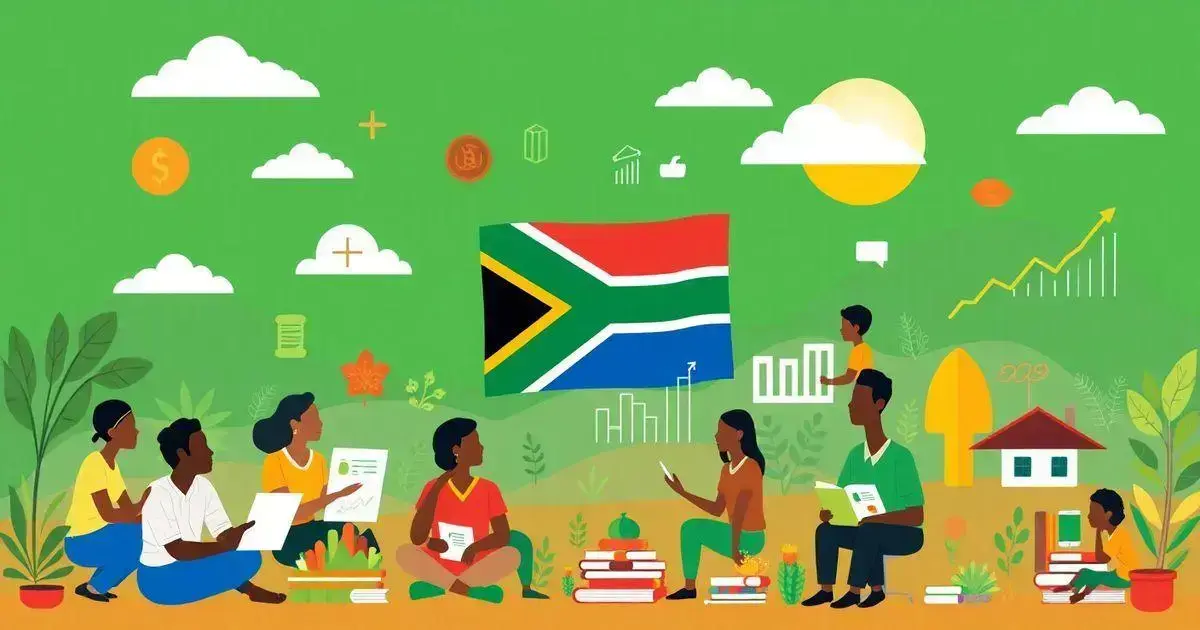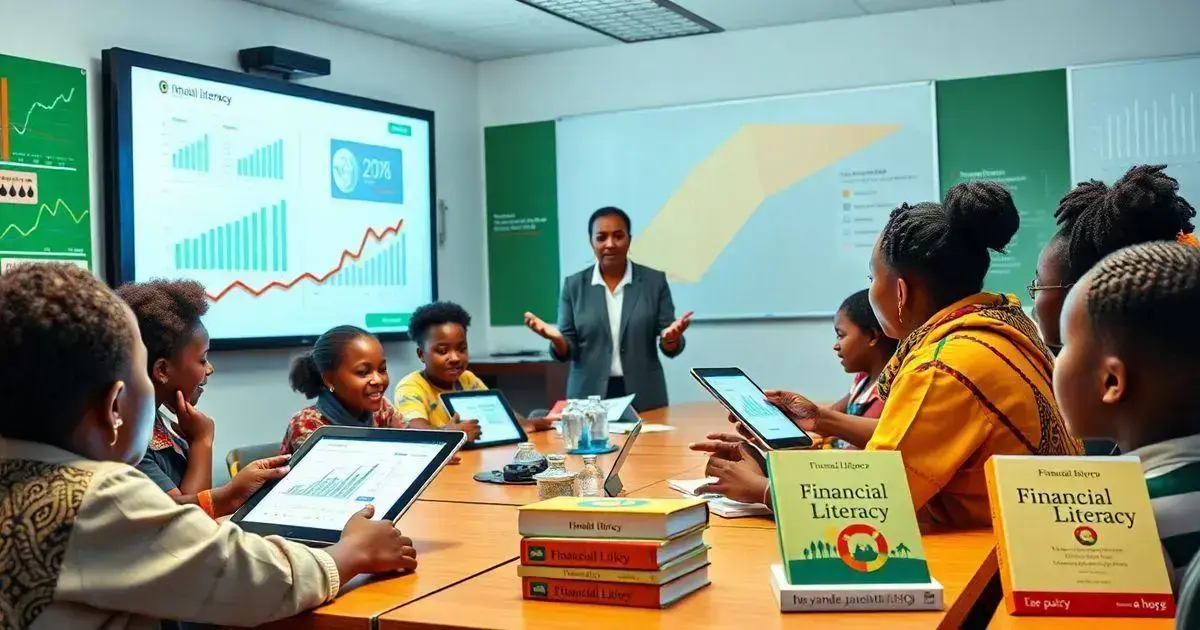Financial literacy in South Africa is more than just a skill—it’s a crucial tool for achieving economic stability and personal empowerment. With the rising cost of living and complex financial systems, understanding how to manage money effectively has never been more important.
From budgeting and saving to making informed investment decisions, financial literacy equips individuals to break free from cycles of debt and build a secure financial future.
Curious about how to improve your financial knowledge and take control of your finances? Continue reading to unlock strategies for long-term success!
Understanding Financial Literacy
Understanding financial literacy is the ability to understand and effectively use financial skills, including personal financial management, budgeting, and investing.
Importance: It is vital for informed financial decisions, especially in challenging economic environments like South Africa.
Budgeting: Helps track income and expenditures, ensuring living within means and avoiding debt.
Saving and investing: Paves the way for financial security and independence.
Educational initiatives: Workshops, community programs, and school curricula to enhance financial knowledge.
The Importance of Financial Literacy in South Africa

In South Africa, the importance of financial literacy cannot be overstated. It is crucial for individuals to manage their money effectively and make informed decisions. Many people face challenges due to a lack of understanding about budgeting, saving, and investing. Financial literacy empowers individuals by providing them the tools needed to avoid debt and increase savings.
Moreover, financial literacy plays a significant role in economic stability and growth. When people know how to manage their finances, they contribute to the economy by spending wisely and saving for the future. This increases overall financial health and reduces poverty levels.
Educational initiatives aimed at improving financial knowledge are essential. Communities must come together to support programs that focus on teaching financial skills at an early age. Access to information and resources will help break the cycle of financial illiteracy and build a more financially responsible population.
Challenges to Financial Literacy in South Africa
In South Africa, numerous challenges to financial literacy exist, making it difficult for individuals to gain essential financial skills. Many people lack access to fundamental education on money management, leading to poor financial choices. Economic factors, such as high unemployment rates, also contribute to the difficulties of learning about finance.
Additionally, there is a widespread misconception about money, with many viewing it as a scarce resource. This mindset can hinder effective financial planning and savings. Without proper knowledge, individuals may fall into debt traps and fail to invest wisely.
Moreover, cultural attitudes towards money can perpetuate financial illiteracy. In many communities, discussing finances is often viewed as taboo. This silence prevents individuals from seeking help or sharing knowledge, reinforcing the cycle of financial ignorance.
To overcome these challenges, it is crucial to promote financial education through accessible workshops, online resources, and community initiatives. Encouraging open conversations about money can also help dismantle cultural barriers and empower individuals to take control of their financial futures.
Key Strategies to Improve Financial Literacy

Improving financial literacy in South Africa requires key strategies that can be implemented at both individual and community levels.
One effective method is through educational workshops, which provide hands-on experience and practical knowledge. These workshops can cover essential topics like budgeting, saving, and investing, making the information relatable and easy to understand.
Another strategy is to incorporate financial education into school curricula. By teaching children about money from a young age, we can equip them with the skills they need to make informed financial decisions in adulthood. Schools can partner with local financial experts to develop engaging programs that appeal to students.
Additionally, using digital tools such as apps and online courses can help individuals learn at their own pace. Many people find it easier to access information digitally, so providing interactive resources can encourage self-directed learning and better retention of knowledge.
Building community programs that promote peer-to-peer learning can also encourage financial literacy. When individuals share their experiences and strategies, it fosters a supportive environment where everyone feels empowered to learn.
Lastly, collaborating with local businesses to offer financial incentives, like discounts for attending financial literacy classes, can motivate people to participate and learn. By employing these strategies, we can create a more financially literate population in South Africa, ready to face economic challenges head-on.
Resources for Enhancing Financial Knowledge
Accessing resources for enhancing financial knowledge is essential for improving financial literacy. In South Africa, there are numerous platforms that provide valuable information and support. First, local non-profit organisations often run workshops and courses focused on financial education. These initiatives aim to empower communities with tools for better money management.
Online educational websites also offer free courses about budgeting, saving, and investing. Engaging in these digital platforms allows individuals to learn at their own pace, making it convenient for various lifestyles. Popular websites provide interactive resources that can simplify complex financial topics.
Books and guides written by financial experts are another excellent resource. Reading about personal finance can offer practical insights and motivate individuals to take control of their financial future. Local libraries often have a selection of these materials available for free.
Furthermore, financial institutions sometimes offer educational resources and tools, such as budgeting apps and online calculators, to help users manage their finances effectively. These tools can enable individuals to track their spending and plan for future expenses.
By utilising these resources, individuals can build a strong foundation for financial literacy, ultimately leading to more informed financial decisions.
Future of Financial Literacy Education in South Africa

The future of financial literacy education in South Africa holds significant promise as awareness continues to grow. Schools are increasingly incorporating financial literacy programs into their curriculums, recognizing the importance of equipping young people with essential money management skills.
Early education on topics like budgeting, saving, and investing prepares students to make informed financial decisions as they navigate adulthood.
Technology is also playing a transformative role in this effort. Digital platforms, including online courses and mobile apps, offer interactive tools that make financial education accessible to a broader audience. These resources cater to different learning styles and provide opportunities for individuals who might not have access to traditional education methods.
Community-driven initiatives are contributing meaningfully to this progress. Local organizations are hosting workshops aimed at teaching practical financial skills essential for everyday life. By involving community members, these events create an environment of collective learning, fostering collaboration and shared knowledge.
Partnerships between the government and financial institutions are another crucial component. By pooling resources and expertise, these partnerships can develop comprehensive educational programs that address the specific financial challenges faced by South Africans. Such collaborations enhance the quality and reach of financial literacy efforts.
As these initiatives gain momentum, South Africa is poised to cultivate a generation better prepared to manage their finances effectively. This progress has the potential to drive economic growth and build a more financially secure society, underscoring the critical importance of financial literacy for the nation’s future.
Building a Path to Financial Empowerment
As we have explored, various challenges exist, but the rise of educational initiatives offers hope.
Community support, online resources, and school programs are paving the way for a financially aware society.
By continuing to prioritise financial education, we can equip future generations with the skills needed to make informed decisions and achieve financial stability.
Through collective efforts, we can foster a culture of knowledge and empowerment, leading to a brighter economic future for all.
